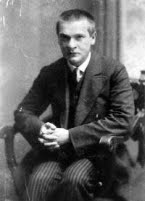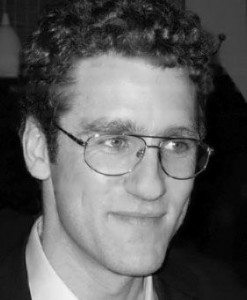Christian Hawkey has written an extraordinary book about Georg Trakl, the great German Expressionist poet: Ventrakl, recently published by Ugly Duckling Presse. All the time Hawkey was working on this project, all I ever heard him say about it was that he had been trying his hand at translating some Trakl poems, and so I was in no way prepared for the book itself when it arrived. Yes, it does contain translations of Trakl’s work, but far more than this it is a compilation of original poems (many of them composed using experimental translation techniques), open letters and short essays resembling prose poems, and each of these documents can be read as a declaration of ambivalent but nonetheless deeply heartfelt love for this most talented and troubled of German poets. Young Trakl, trained as a pharmacist, served in the First World War and found himself left  singlehandedly in charge – without benefit of drugs or any other medical aid – of a tent filled with 90 wounded soldiers, many of them dying and some in such pain that they shot themselves to end it. The experience broke him – though it seems he was troubled even before this; his early history included incest, for one thing, and some of the most touching passages in Hawkey’s book are devoted to Trakl’s youngest sister, Greta, Gretl, Margarethe, who like her brother struggled with addiction and took her own life several years after her brother’s suicide by opium at age 27.
singlehandedly in charge – without benefit of drugs or any other medical aid – of a tent filled with 90 wounded soldiers, many of them dying and some in such pain that they shot themselves to end it. The experience broke him – though it seems he was troubled even before this; his early history included incest, for one thing, and some of the most touching passages in Hawkey’s book are devoted to Trakl’s youngest sister, Greta, Gretl, Margarethe, who like her brother struggled with addiction and took her own life several years after her brother’s suicide by opium at age 27.
In Hawkey’s short essay on a photograph of Trakl as a toddler, we learn that 19th century mothers tried to cheat death of the sons who were said to die more often than daughters by dressing all their infants as girls, producing an early childhood that remained ungendered until the “breeching” of boys at the age of 4 or 5. In another, this time addressing a photograph that shows the poet as a grown man, Hawkey notes a sense “that your [i.e. Trakl’s] feet are not quite touching the floor.” The essays on photographs scattered throughout the volume are some of my favorite parts of the book – they are at once fanciful and informative and display both a depth of research and the ever-changing tactics Hawkey tries out as he approaches his subject, alternating between apparently objective description, questioning, speculation and plea. These ekphrastic pieces are interspersed with Hawkey’s readings of particular poems and lines by Trakl – notably the opening of “Grodek,” one of Trakl’s best-known poems (“In the evening the autumn woods resound / With deadly weapons”) – which Hawkey explicates as standing in for the experience of the moment when the entire pastoral tradition of the nineteenth century was blown apart by the mechanized/dehumanized violence of World War I. We tend to think of Trakl as the sort of Nature-drunk Expressionist whose work shows him to be heir to the late-19th-century French symbolists Rimbaud and Baudelaire, and he was that; but his poems also bear witness, in highly abstract form, to the anguish of the generation that saw modernity roll into the Black Forest on tank tracks. Hawkey shares bits of this background with us throughout the book, so that by the time he presents his own translation of “Grodek” as an epilogue, he has convinced us of the context in which the poem is asking to be read.
Hawkey’s main engagement with Trakl, though, comes in the form of the poems in many different forms scattered throughout the volume. These tend to be much more Hawkey than Trakl. “I am unfolding a moth into a fluttering mouth,” begins one poem entitled “You Bent My Megahertz”; another asserts: “Voles hump under the Holland Tunnel; wonder follows / A white hand down blue holes.” Hawkey has borrowed from  Trakl, most obviously, the use of color to define a field containing otherwise dissociated objects, and less obviously the sense of an overarching design knitting together weirdly assembled objects in a list – the strategy that always makes Trakl’s nature poems seem so odd, as there are invariably items on his lists whose inclusion renders an entire scene uncanny, such that we sense the inner jangledness of the point of view assembling these tableaux. Hawkey’s own work has always been about using language to startle the mind out of its habitual patterns of perception, and in this sense, Trakl is his strategic ally. And in fact it becomes apparent over the course of the book, with its many poems that are so clearly Hawkey’s own while also being curiously Trakl-inflected, how deeply Hawkey’s work has perhaps always been indebted to that of the older poet. Trakl’s infatuated symbolism, in which desire always appears to quiver about blue trees and black lakes and red skies, jolts in startling ways oddly akin to the visual inventiveness of Hawkey’s work.
Trakl, most obviously, the use of color to define a field containing otherwise dissociated objects, and less obviously the sense of an overarching design knitting together weirdly assembled objects in a list – the strategy that always makes Trakl’s nature poems seem so odd, as there are invariably items on his lists whose inclusion renders an entire scene uncanny, such that we sense the inner jangledness of the point of view assembling these tableaux. Hawkey’s own work has always been about using language to startle the mind out of its habitual patterns of perception, and in this sense, Trakl is his strategic ally. And in fact it becomes apparent over the course of the book, with its many poems that are so clearly Hawkey’s own while also being curiously Trakl-inflected, how deeply Hawkey’s work has perhaps always been indebted to that of the older poet. Trakl’s infatuated symbolism, in which desire always appears to quiver about blue trees and black lakes and red skies, jolts in startling ways oddly akin to the visual inventiveness of Hawkey’s work.
At the same time, the engagement with Trakl also forces the younger/older poet into territory not previously charted in his work. The last thing anyone would think to call Christian Hawkey is a confessional poet; he generally appears in his poems wearing not so much a mask as a full-body wetsuit. In Ventrakl, however, he shows a new side of himself as a poet, because it soon becomes clear that his study of Trakl is profoundly, passionately, even tormentedly personal. In passage after passage he speaks to Trakl directly, in the second person, in what eventually starts to seem a desperate effort to connect with this poet who lived a century ago and died when he was far younger than Hawkey is now. Beyond all notion of tribute and homage, I sense a hidden undercurrent of anxiety trembling in the interstices of this book: What does it mean, Hawkey appears to be asking between the lines of every page, to discover oneself to be the kindred spirit of a man whose life appears to have been bracketed by eternally insatiable hungers, violence and despair? Trakl is an odd bedfellow indeed. And yet his life and work have exerted a hypnotic fascination on so many writers. Hawkey’s memorable book shows us why.


It’s funny, I really could never identify Trakl with the decadents like Baudelaire, even if his life resembled theirs. All the colors and abstractions put me more in mind of a modernized Holderlin. There’s just never that hedonistic air to Trakl that the French writers have.
That said, I also think of Grodek as highly unrepresentative of his poetry. I’m sure I’m biased knowing that it and his other final poem came after some life-changing experiences, but even after I put that out of my mind, those last two seem quite different in technique and approach from everything he had previously written.
Great review! Now you can read mine. 🙂